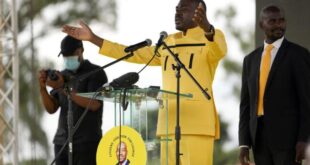A year since the war in Ukraine began, Africa’s reaction appears not to have shifted much. In a UN resolution condemning Russia’s invasion, African countries were still as divided as when the war began.
Thirty countries – two more than in March 2022 – voted in favour of the resolution.
Madagascar and South Sudan, who both abstained last year, voted with much of the rest of the world this time. Morocco had missed the 2022 vote but cast its ballot in favour of the resolution on Thursday.
Gabon, however, went the other way, abstaining this time after voting for the previous resolution. It joined 14 other African nations, together accounting for nearly half of all abstentions.
These countries hold that their position is non-aligned with either Russia or a Western-backed Ukraine. An increase in engagement and visits from senior officials from both Western countries and Russia over the past year have done little to sway them.
Barely a day before the UN vote, Ukraine’s President Volodymyr Zelenskyy made a phone call to his Ugandan counterpart, Yoweri Museveni. The country abstained from Thursday’s vote as it did a year ago, and so did Namibia while it hosted US First Lady Jill Biden who is on her maiden tour of Africa in her current role.
“It’s not flipping a light switch,” said US Foreign Secretary Anthony Blinken to the Atlantic. “It’s moving an aircraft carrier,” he added, expressing optimism that South Africa was “on a slow trajectory to non-align with Russia.” He acknowledged that such countries have had a decades-long relationship with Russia and had the support of the Soviet Union in their fight against apartheid and colonialism.
During the struggle against white-minority rule in South Africa, the US government designated the Africa National Congress – today’s ruling party – a terrorist group. Despite winning a Nobel Peace Prize in 1993, jointly with the last apartheid leader Frederik de Klerk “for the peaceful termination of the apartheid regime and for laying the foundations for a new democratic South Africa” and becoming the country’s first black president from 1994 to 1999, Nelson Mandela remained on the US terror watchlist until it was revised in 2008.
“Of course, unfortunately, more than unfortunately, the United States was much too sympathetic to the apartheid regime, so that history also doesn’t get erased, you know, overnight,” Mr Blinken was quoted as saying.
But it’s not only about the past. Nations like Eritrea and lately Mali – both largely isolated from the global community – have found an ally in Russia. They were among African countries that recently hosted its Foreign Minister Sergey Lavrov, and both voted against the UN resolution.
Seven other African countries – Senegal, Tanzania, Equatorial Guinea, Burkina Faso, Eswatini, Guinea Bissau and Cameroon – did not vote at all. The first three had voted to abstain last year.
It’s never reasonable to generalise the reaction and sentiment of a continent of more than 50 countries. Each would have its own reasons for whichever way they voted. Whilst the vote is not legally binding, it has brought to the fore and will no doubt continue to shape geopolitical alliances. BBC
 Nhau News Online News that is accurate, reliable, trustworthy!!
Nhau News Online News that is accurate, reliable, trustworthy!!
